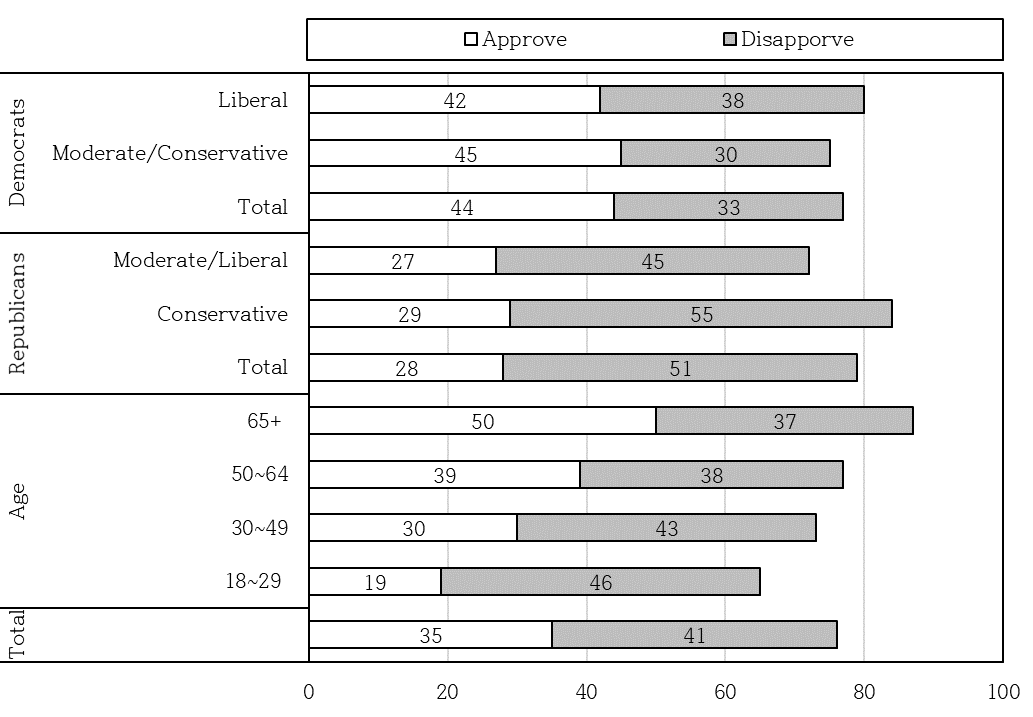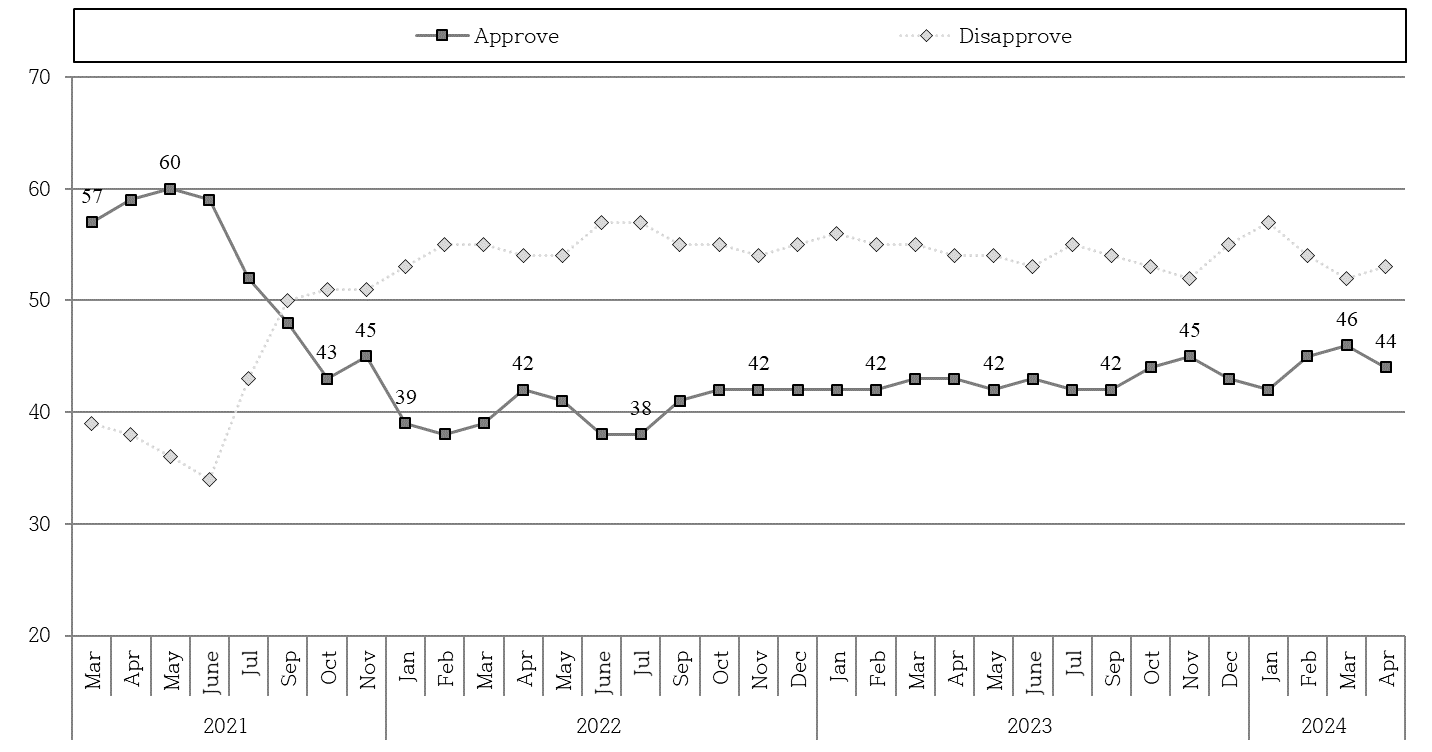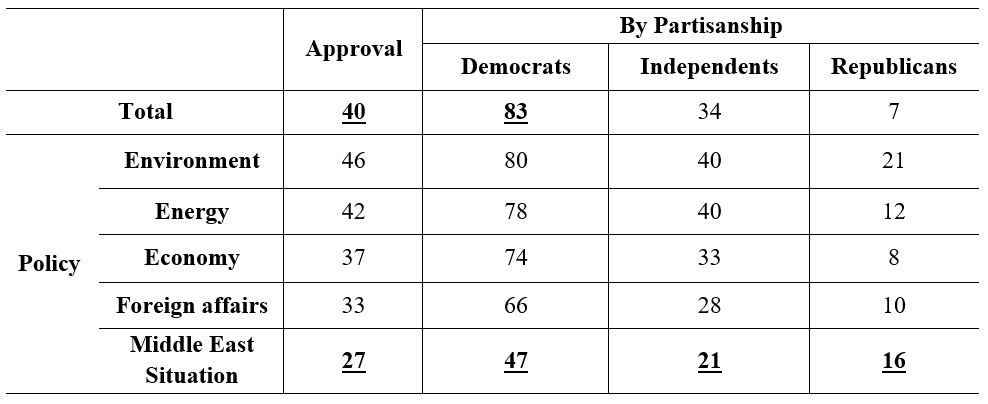Americans’ Views on U.S. Policy Toward the Israel-Hamas War: The Turmoil Among Young Progressive Democrats
The U.S. presidential election, a rematch between President Joe Biden and former President Donald Trump, is in full swing. President Biden, who has remained unpopular throughout his term domestically, is caught in a ‘two wars’ dilemma internationally. Some argue that uncertainty has increased over President Biden’s re-election due to a series of foreign policy failures in the Ukraine and Gaza wars. This means that, excluding the Iraq War, which turned into a severe social problem in America in 2008, foreign issues might be an important factor in the U.S. presidential election. This is an interesting claim as it has never been before.
As the war between Israel and Hamas continues, the claim that foreign policy issues will become critical in the 2024 presidential election needs to be closely examined. This Issue Brief analyzes multiple polling data to estimate the impact of foreign issues, such as the Israel-Hamas war, on Americans’ vote choices.
According to several polls published to date, some young progressive voters, who are traditional supporters of the Democratic Party, disapprove President Biden’s response to the Israel-Hamas war and tend to withdraw their support as a result.
Figure 1. Americans’ view of the U.S. response to the Israel-Hamas war (%)
In December 2023, the Pew Research Center revealed that only 35% of Americans approved President Biden’s response to the Israel-Hamas war (41% disapprove, 24% don’t know). The older people are more likely to support President Biden. For example, 50% of those over 65 supported his response to the war, while 46% and 43% of young people in their 20s and 30s, respectively, viewed it negatively (see Figure 1). In particular, only 19% of people in their 20s supported President Biden’s response to the war. It is clear that there is a dissatisfaction with President Biden’s response to the war, especially among young people.
According to another survey by Pew Research Center conducted in April 2024, young Americans sympathized more with Palestinians than with Israelis (18~29 years old: 33%), and 60% favored Palestinians (46% favored Israelis). This was noticeable among young people who support the Democratic Party (sympathy: 47%, favorability: 76%). Pro-Israel views are still common among Americans, but in the late 2000s, the perception of Palestine among young people (18~29 years old) had clearly been improved.
This is because young people more easily and frequently encounter foreign policy issues through social media and are more likely to sympathize with the humanitarian crisis caused by war. They grew up with exposure to movements such as ‘Occupy Wall Street’, ‘Black Lives Matter’, and students’ gun control campaigns. As civilian casualties rapidly increased in Gaza, a pro-Palestinian anti-war movement was organized around 50 campuses, including Columbia University, the University of Michigan, and UCLA.
President Biden’s Approval Rating Unchanged Despite the Israel-Hamas War
However, the approval rating for President Biden did not decline. In fact, President Biden’s approval rating has remained around 40% since falling in the third quarter of 2021 and has remained unchanged since the outbreak of the Israel-Hamas war in October 2023.
Figure 2. President Biden’s approval rating (%)
According to another survey by Pew Research Center conducted in April 2024, young Americans sympathized more with Palestinians than with Israelis (18~29 years old: 33%), and 60% favored Palestinians (46% favored Israelis). This was noticeable among young people who support the Democratic Party (sympathy: 47%, favorability: 76%). Pro-Israel views are still common among Americans, but in the late 2000s, the perception of Palestine among young people (18~29 years old) had clearly been improved.
In the early days of the war, the Biden administration opposed a ceasefire and sided with Israel, even though civilian casualties increased due to Israel’s massive bombing and collective punishment of the Gaza Strip to destroy Hamas. As a result, turmoil was detected among the young, progressive Democratic Party supporters who contributed to President Biden’s election in 2020. Also, starting in October 2023, many Arab and Muslim community leaders, beginning in Minnesota, began campaigning to abandon and defeat President Biden, who did not call for a ceasefire in the war. During the 2020 presidential election, President Biden won seven swing states, including Minnesota, Michigan, Arizona, Wisconsin, Florida, Georgia, Nevada, and Pennsylvania, where campaigns against him are currently taking place.
Table 1. President Biden’s rating for his handling of major policy issues (%)
When we see the approvals of President Biden and his administration by specific policies, low scores were observed in foreign policy and responses to the Middle East situation. According to Table 1, which summarizes a Gallup survey in March 2024, 46% and 42% approved the environmental and energy policies, respectively, exceeding the overall average (40%). On the other hand, the economy and diplomacy fell below the overall average, with only 37% and 33%, respectively, giving an approval. The lowest approval was in President Biden’s response to Middle East issues between Israel and Palestine (approval: 27%).
Indeed, the general American voter does not consider external issues as a determining factor when deciding their vote choices. In April 2024, Americans’ major national issues were inflation (35%), immigration (35%), economy and jobs (26%), gun control (17%), crime rate (15%), and healthcare (15%), abortion rights (14%), while only 5% each said foreign policy and the war between Israel and Hamas were important. In Seoul, in May 2024, Mike Pompeo, who served as Secretary of State during the Trump administration, also said that in the presidential election, inflation and immigration at the southern border, rather than external issues, would be decisive in voters’ choices.
The Iraq War was a key issue in the 2008 U.S. presidential election. However, rather than an external issue, this was due to the serious social problems caused by post-traumatic stress disorder among veterans at the time. The decisive factor in President Carter’s failure to be re-elected in 1980 was the failure of economic policy due to high inflation rather than the foreign policy crisis.
As a result of the analysis, the observation that the Israel-Hamas war ahead of this year’s presidential election made President Biden’s re-election uncertain was not clearly supported in the polling data. When deciding which candidate to support, American voters viewed domestic issues such as immigration, inflation, the economy and jobs, gun control, crime rate, healthcare, and abortion rights as more important than external issues. In addition, progressive young people also responded in a public opinion poll, saying, “I dislike both candidates, but I have greater antipathy toward candidate Trump.”
The Prospects of the Anti-War Movement and Young Voters
According to public opinion polls so far, young American voters have given negative evaluations to the U.S. response to the Israel-Hamas war, but President Biden’s approval rating has not declined since the war. Although they criticized President Biden’s policy toward the Middle East, it is hard to assume that young constituents have completely withdrawn their support for him. Currently, it seems unlikely that young people’s evaluations of specific external issues will emerge as a key variable that will determine the future U.S. presidential election.
Moreover, the Biden administration sharply changed its position to support an immediate ceasefire, expand humanitarian aid to Palestine, and increase pressure on Israel. As a result, the anti-war movement among young people, which was believed to be a negative factor in President Biden’s re-election bid, is also expected to subside after March 2024.
President Biden criticized the anti-war movement as anti-Semitic but expressed a neutral stance in support of freedom of expression in universities. Accordingly, the anti-war movement appears to have lost momentum and is faltering. Anti-war public sentiment has also weakened, and according to a May 2024 survey by The Economist and YouGov, only 28% of Americans said they supported anti-war protests (47% opposed). The reasons for the decline in approval of the anti-war movement is that it is increasingly viewed as having strayed from its initial cause —criticism of Hamas —and as inciting violence on campus.
In this regard, the prediction that the war between Israel and Hamas will have a detrimental effect on President Biden in the U.S. presidential election seems premature.
This article is an English Summary of Asan Issue Brief (2024-16).
(‘미국 내 이스라엘∙하마스 전쟁 반대 여론과 미 대선’, https://www.asaninst.org/?p=94121)

 Facebook
Facebook Twitter
Twitter



